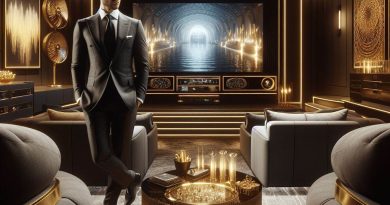Tech Innovations Shaping Luxury Real Estate
Last Updated on January 21, 2024
Introduction
In the realm of luxury real estate, the influence of technological innovations cannot be overstated.
These advancements have ushered in a new era, reshaping the very fabric of high-end property dealings.
From smart home integrations to data-driven insights, technology has become the cornerstone of a modern luxury living experience.
This blog post seeks to unravel the intricate tapestry of how technology is revolutionizing the luxury real estate sector.
By delving into specific advancements, we aim to provide a comprehensive understanding of the profound implications these innovations hold for both property developers and discerning buyers.
Through a succinct exploration, we endeavor to shed light on the purposeful integration of tech in luxury real estate, illustrating how it not only meets but exceeds the evolving expectations of the affluent clientele.
Smart Home Systems
Overview of smart home technologies
Smart home technologies refer to the integration of various systems and devices within a home to create an automated and interconnected living environment.
These technologies include devices such as smart thermostats, lighting control systems, security systems, automated blinds, and voice-controlled assistants like Amazon Echo or Google Home.
Integration of smart home systems in luxury real estate
Luxury real estate developers are increasingly incorporating smart home systems into their properties to enhance the living experience of their high-end clientele.
These systems provide homeowners with convenience, comfort, control, and security, making their lives easier and more luxurious.
The integration of smart home systems also adds to the overall value and exclusivity of luxury properties.
Benefits of smart home technology in luxury real estate
- Convenience: Smart home systems allow homeowners to control various aspects of their homes remotely through smartphone apps or voice commands.
- Comfort: Automated features such as temperature control, lighting control, and motorized blinds create a comfortable living environment tailored to individual preferences.
- Control: Smart home systems provide homeowners with full control over their homes, allowing them to monitor security, adjust settings, and manage energy consumption.
- Security: Smart security systems offer advanced features such as video surveillance, motion detection, and remote access, enhancing the safety of luxury properties.
- Energy Efficiency: Smart home technologies help reduce energy consumption through features like smart thermostats and automated lighting, leading to cost savings and sustainability.
Examples of innovative smart home features
- Biometric access control systems that use fingerprints or facial recognition to provide secure entry.
- Voice-activated virtual assistants that can perform tasks and answer questions.
- Smart mirrors with built-in displays and voice commands for personalized information and entertainment.
- Automated window treatments that adjust based on natural light and privacy preferences.
- Smart appliances and kitchen systems that can be controlled remotely or through voice commands, improving efficiency and convenience.
In essence, smart home systems have become an integral part of luxury real estate, offering homeowners convenience, comfort, control, security, and energy efficiency.
These technologies add value to luxury properties and provide a more enjoyable and luxurious living experience for high-end clientele.
With continuous advancements in technology, we can expect even more innovative smart home features to shape the future of luxury real estate.
Read: Luxury Property: Future Market Predictions
Virtual Reality (VR) and Augmented Reality (AR)
Virtual reality and augmented reality technologies
The virtual reality (VR) is a technology that uses computer-generated simulations to create a completely immersive experience for users.
Augmented reality (AR) superimposes computer-generated images onto the real world, enhancing the user’s perception of their surroundings.
Both VR and AR rely on advanced hardware such as headsets or smart glasses to deliver their immersive experiences.
Application of VR and AR in the luxury real estate market
VR and AR technologies have revolutionized the way luxury real estate is showcased to potential buyers.
Real estate developers can create virtual or augmented tours of properties, allowing buyers to explore them remotely.
Buyers can visualize room layouts, finishes, and furniture configurations, giving them a realistic sense of the property.
Virtual staging enables designers to digitally furnish and decorate a property, offering different options to buyers.
With AR, buyers can use their smartphones or tablets to view virtual elements overlaid onto the property they are physically visiting.
Enhancing the buyer’s experience through VR and AR
VR and AR technologies bring a new level of convenience and efficiency to the luxury real estate buying process.
Buyers can virtually visit multiple properties from the comfort of their homes, saving them time and travel expenses.
VR and AR allow buyers to make informed decisions by giving them a more accurate representation of the property.
These technologies also facilitate collaboration between buyers, agents, and architects during the design and customization phase.
Buyers can interact with the virtual environment, manipulating elements like furniture, materials, or architectural features.
Benefits and limitations of VR and AR in luxury property sales
One of the main benefits of VR and AR is their ability to create emotional connections and engage potential buyers.
These technologies provide a sense of presence, allowing buyers to envision themselves living in the property.
VR and AR can shorten the sales cycle by eliminating unnecessary property visits and narrowing down options.
However, VR and AR experiences require expensive equipment, limiting their accessibility to a broader audience.
Some buyers may still prefer physical visits to the property as VR and AR cannot replicate the tactile experience.
Technical glitches or limitations in image quality and resolution can also impact the overall experience.
In fact, virtual reality (VR) and augmented reality (AR) technologies are transforming the luxury real estate market.
These immersive technologies enhance the buyer’s experience, allowing them to virtually explore properties, visualize designs, and make informed decisions.
While VR and AR offer numerous benefits, accessibility and technical limitations remain challenges for widespread adoption.
As these technologies continue to evolve, they will undoubtedly play a significant role in shaping the future of luxury real estate.
Read: Eco-Friendly Luxury on the Waterfront in 2024
Internet of Things (IoT) and Home Automation
Overview of the Internet of Things and Home Automation
The Internet of Things (IoT) refers to the network of interconnected devices and objects that are embedded with sensors, software, and other technologies to collect and exchange data.
Home automation, on the other hand, involves the automation of various household tasks and functions, such as controlling lighting, temperature, security, and appliances, through smart devices and systems.
Integration of IoT and home automation in Luxury Properties
Luxury properties have embraced the integration of IoT and home automation to enhance the living experience of their residents.
These technologies allow homeowners to have complete control over their homes, customized settings, and seamless connectivity between devices.
Improving convenience, security, and energy efficiency in high-end real estate
The integration of IoT and home automation in luxury real estate offers numerous benefits, including convenience, security, and energy efficiency.
Homeowners can remotely control and monitor their homes, ensuring that lights are turned off, security systems are armed, and energy-consuming devices are adjusted to save electricity.
Examples of IoT devices and home automation systems used in luxury homes
- Smart thermostats: These devices allow homeowners to control the temperature of their homes remotely and even learn their preferences to automatically adjust settings for optimal comfort and energy savings.
- Voice-activated assistants: Virtual assistants such as Amazon Echo or Google Home enable residents to control various IoT devices through voice commands, enhancing convenience and accessibility.
- Smart lighting systems: With smart lighting, homeowners can create customized lighting scenes, adjust brightness and color, and even synchronize lighting with music or movies for a more immersive experience.
- Surveillance and security systems: IoT-enabled security systems offer advanced features such as motion detection, facial recognition, and real-time monitoring through mobile apps, ensuring the safety and security of luxury properties.
- Smart appliances: From refrigerators that can create shopping lists to ovens that can be preheated remotely, smart appliances offer increased convenience and efficiency in high-end real estate.
- Automated window coverings: Motorized blinds and curtains can be controlled through smartphone apps or programmed to adjust based on sunlight levels, providing privacy and optimizing natural light.
- Energy management systems: These systems help monitor and optimize energy consumption by providing insights, such as real-time energy usage and cost breakdowns, allowing homeowners to make informed decisions.
- Entertainment systems: Home automation can integrate audio, video, and entertainment systems into a centralized control, providing a seamless experience for luxury homeowners.
In short, the integration of IoT and home automation has revolutionized the luxury real estate market.
High-end properties now offer advanced technological solutions that enhance convenience, security, and energy efficiency.
With a wide range of IoT devices and home automation systems available, luxury homeowners can enjoy the benefits of a smart home that seamlessly connects various aspects of their daily lives.
Read: Luxury Real Estate: Urban vs Rural Investing

Artificial Intelligence (AI) and Machine Learning
Artificial intelligence and machine learning technologies
(AI) and machine learning are revolutionary technologies that have the potential to transform luxury real estate.
AI refers to the development of computer systems capable of performing tasks that would typically require human intelligence.
This includes tasks like speech recognition, decision-making, and problem-solving.
On the other hand, machine learning is a subset of AI that provides machines with the ability to learn and improve from experience without being explicitly programmed.
AI applications in luxury real estate
The luxury real estate industry has embraced AI and machine learning technologies to enhance various aspects of the business.
These applications streamline processes, improve customer experiences, and provide valuable insights. Some key applications include:
- Virtual Assistants: AI-powered virtual assistants can interact with potential home buyers, answer their queries, and provide personalized property recommendations based on their preferences.
- Chatbots for Customer Service: Luxury real estate businesses are using chatbots to provide 24/7 customer support, answer frequently asked questions, and guide users through the property search process.
- Smart Home Automation: AI is being integrated into luxury properties to create smart homes that can automate various functions like security, temperature control, and entertainment systems.
Machine learning algorithms learn a homeowner’s preferences to optimize these functions automatically.
Personalized property search and recommendation systems
AI and machine learning algorithms have revolutionized property search and recommendation systems in luxury real estate.
These technologies analyze vast amounts of data, including user preferences, browsing history, and market trends, to provide personalized property suggestions to potential buyers.
This saves time and effort for buyers and helps them discover properties that match their specific needs and preferences.
Personalization in property search also extends to virtual property tours.
AI-powered virtual reality tools enable potential buyers to virtually explore properties without physically visiting them.
These tools provide an immersive experience, allowing buyers to visualize themselves in the space and make more informed decisions.
Predictive analytics for property valuation and investment decisions
AI and machine learning algorithms facilitate predictive analytics in luxury real estate.
By analyzing historical property data, market trends, economic indicators, and demographic information, these technologies can accurately predict property valuations.
This helps buyers and investors make informed decisions regarding property purchases and investments.
Additionally, predictive analytics can also identify emerging real estate trends and investment opportunities.
These insights enable real estate professionals to stay ahead of the market, identify lucrative areas for development, and maximize their returns.
In general, artificial intelligence and machine learning technologies are revolutionizing the luxury real estate industry.
Enhancing property search, recommendation systems, and improving customer experiences through virtual assistants and chatbots.
Enabling smart home automation and facilitating predictive analytics for property valuation and investment decisions.
As AI continues to advance, luxury real estate will undoubtedly witness further transformation and innovation.
Read: Waterfront Real Estate: Trends to Watch in 2024
Blockchain Technology
Overview of blockchain technology
Blockchain technology is a decentralized and transparent digital ledger that records transactions across multiple computers.
Each transaction is called a block and is linked together in a chain, hence the name blockchain.
This technology ensures security, transparency, and immutability of data, making it an ideal solution for the luxury real estate industry.
Blockchain applications in the luxury real estate industry
- Smart Contracts: Blockchain enables the use of smart contracts, self-executing agreements that automatically facilitate and enforce contract terms.
- Title Verification: Blockchain can store property ownership records, ensuring accurate and reliable verification of titles.
- Fractional Ownership: Blockchain allows for the implementation of fractional ownership models, enabling investors to own fractions of high-value properties.
- Tokenization: Luxury properties can be represented as digital tokens on a blockchain, increasing liquidity and accessibility to investors worldwide.
Enhancing security and transparency in property transactions
Blockchain technology reduces the risk of fraud and hacking through its decentralized and immutable nature.
All transactions recorded on the blockchain are transparent and can be accessed by authorized participants, improving trust and accountability.
By eliminating intermediaries and ensuring tamper-proof records, blockchain streamlines property transactions and minimizes the potential for errors.
Potential challenges and future prospects of blockchain in luxury real estate
- Regulatory Compliance: The adoption of blockchain technology in the luxury real estate industry requires overcoming regulatory challenges.
- Implementation Costs: Integrating blockchain solutions may involve significant upfront costs for infrastructure and system development.
- Standardization: The industry needs to establish common standards and protocols to ensure interoperability and widespread adoption of blockchain technology.
- Evolving Technology: As blockchain technology advances, it should address scalability and speed concerns to handle the high transaction volumes of the luxury real estate market.
Despite these challenges, the future prospects of blockchain in luxury real estate are promising.
Increased security, transparency, and efficiency offered by blockchain technology can attract more investors and streamline property transactions.
As regulations catch up and technology evolves, blockchain has the potential to become a key driver in shaping the luxury real estate industry.
Conclusion
Recap of the discussed tech innovations shaping luxury real estate
In this post, we explored several tech innovations that are currently shaping the luxury real estate industry.
Virtual and augmented reality showcase properties.
Smart home tech enhances convenience and security. Home automation systems advance.
These innovations have revolutionized the way luxury properties are marketed and experienced.
Importance of staying updated with technological advancements in the industry
As the luxury real estate market evolves, it is crucial for industry professionals to adapt and stay updated with the latest technological advancements.
These innovations not only provide a competitive edge but also enable professionals to provide clients with an immersive and personalized experience.
Being knowledgeable about tech trends allows agents to make informed decisions and effectively leverage technology to meet clients’ needs and expectations.
Closing thoughts and final remarks
The world of luxury real estate continues to be shaped by innovative technologies.
It is essential for industry professionals to embrace these advancements and leverage them to enhance their business processes, marketing strategies, and client experiences.
By staying informed and proactive, professionals can pave the way for success in the ever-evolving luxury real estate landscape.


